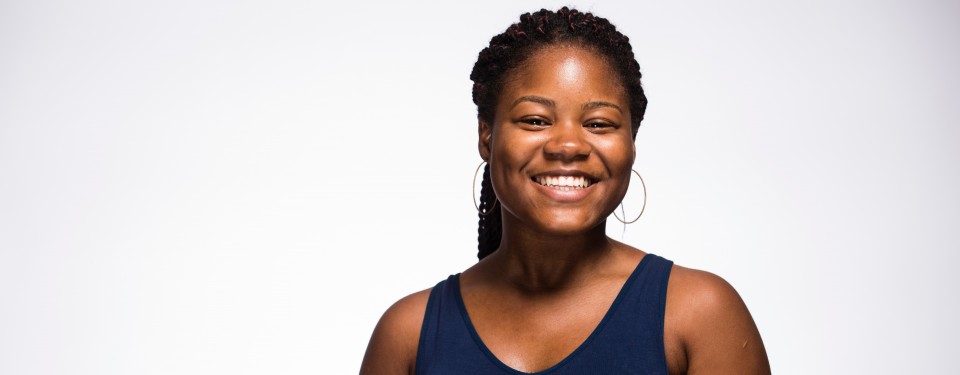Home.
Jheanelle Owens '21 reflects on her first month at Tufts.
Jamaica is not Massachusetts. This obvious statement has become even more obvious to me over the course of the last few weeks as I make the transition from being a high schooler in Jamaica, where I have lived all my life, to being a freshman here at Tufts University. I was fully aware that this would be quite an adjustment, so I decided to participate in a pre-orientation program to get a head start at feeling normal.
Joining the SQUAD (Students’ Quest for Unity in the African Diaspora) program seemed like the most natural way of achieving this. This program lives up to its perfect acronym; I came in contact with several students directly from countries of the African continent such as Rwanda and Nigeria, students whose parents originated from places like Ghana, Cape Verde, and Haiti, and African-American students whose families have lived in the U.S. for generations. It was great to see so much diversity in one subset of the Tufts population. However, I could not help but notice that I was the only person, freshman or upperclassman, participating in the program who originates from Jamaica. In fact, I am the only person in the Class of 2021 from the English-speaking Caribbean. This gave me another reason to stand out at a time when I wasn’t sure how to hold myself up. Sometimes, we feel that the things that make us who we are will isolate rather than distinguish us. I was afraid that my unique nationality and heritage would isolate me from the peers I had predicted would connect with me the most.
This myth was quickly dismissed for me. Our peer leaders, the sophomores and juniors who organised the SQUAD program, took us to Boston for fun activities such as Escape the Room and also enlightening ones like visiting the Museum of African American History, and touring Roxbury where we saw the home of Malcolm Little. I enjoyed being immersed in American culture and history as it made me feel closer to those around me as well as the country I will be calling home for the next four years.
Although becoming acquainted with American culture was great, I still longed for Jamaica. On the last night of SQUAD we had a two hour dinner party on a cruise around Boston harbour. As the night went on, it became less of a dinner party and more of a party. The usual hip hop and rap favourites played; Cardi B’s hit “Bodak Yellow” had everyone (but myself) rapping lyrics. Then suddenly, in a moment where persons were taking a break from the dance floor, the Jamaican dancehall favourite “Bicycle Ride” by Vybz Kartel began. I immediately exited the conversation I was having (sorry, Ethan), took my spot in the middle of the empty dance floor, and... represented my country. I represented my country well. The quiet intellectual of SQUAD suddenly became a true dancehall queen. (An unexpected benefit of being the only Jamaican is that my dance skills are seemingly amazing when really, they are average at best).
More popular dancehall songs were played throughout the night. I was pleased to see everyone respond as vivaciously as they did to Cardi B’s song. I knew that dancehall was popular outside of Jamaica, but seeing everyone get excited about and singing along to the music I grew up with made me feel at home.
Even so, there are some parts of home that I am glad I do not see in Tufts. At a sale the bookstore hosted before the first week of classes began, I spotted my country’s flag hanging beside the LGBT pride flag. Immediately, I thought of the violent homophobia and transphobia that persists in Jamaica to this day despite the rest of the world moving forward. The likelihood of seeing the pride flag in Jamaica is non-existent, let alone next to the national flag. I took a picture of myself between these two flags, these two crucial parts of my identity, and posted it on Instagram. I expected some level of discontent from my Jamaican peers; I did not expect death threats from complete strangers back home.

Once my family here at Tufts found out, I was showered in love and support. The incident reminded me of a concept introduced to SQUAD by K, the brilliant newly appointed director of the Women’s Center. K wrote on the black board the following sentence: Blaq Folx are from the Future. Essentially, this means that the intersection between the black and queer communities is filled with people of great power and creativity that transcends and challenges modern society. Afrofuturism is what K called it.
I think of the home I left behind and the home I have now. One is beautiful in many ways, but stuck in the past. The other is still a little unfamiliar, but is inclusive and focused on the future. Jamaica will always be my first and most loved home, but there is no room left for me to grow there. That is why I am here: to grow and become part of the future so that I have a say in what it looks like. As for my beloved island in the West Indies, I hope it finds room within itself for change.
